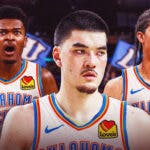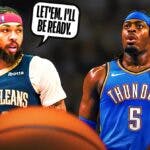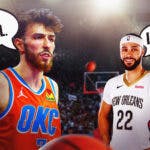When the Oklahoma City Thunder agreed to trade Paul George to the Los Angeles Clippers, a gut reaction was that Russell Westbrook was the next player on the move, and understandably so.
At the same time, a potential Westbrook trade comes with several complexities, from Oklahoma City's perspective.
4. A Westbrook trade is going to be a virtual salary match with some draft compensation

A month before the outset of the 2017-18 NBA regular season, the Thunder gave Westbrook a five-year, $207 million extension. There are two preeminent reasons for this decision: 1) It kept the face of the franchise intact, and 2) It was a selling pitch for George to re-sign with the Thunder in nine months. Sure enough, George re-upped with the Thunder on a four-year, $137 million deal the ensuing summer.
With George now gone, the Thunder are expected to entertain more trades, headlined by a potential Westbrook one. Here's the problem: The main part of a Westbrook return is going to be matching salaries. Westbrook is due roughly $38 million next year; that's not exactly an easy number to match in salaries.
The Miami Heat have been mentioned as a trade partner for the Thunder, and they have the salaries to get a deal done. Goran Dragic is due $19 million next season in what is the final year of a five-year deal; James Johnson is due $15 million next season; Justise Winslow is due $13 million next season; Dion Waiters is due $12 million next season.
However, Miami doesn't have a surplus of draft picks to offer. They can counter the Thunder with them getting Westbrook's contract off the books as an asset. We're talking about trading one of the best players and most talented point guards in NBA history for the sake of balancing out salaries and maybe a draft pick or two. That's insane.
Concurrently, Westbrook's contract, which the Thunder happily gave him, is the reason for this.
Over the last four years, teams have dished out hefty deals with the hopes of getting big results in the early years of the deal, and everything else is a bonus; it's a bad practice that leads to virtually untradeable contracts.
3. In a “fair” trade, there are few teams that can deplete their assets and still compete

If we removed money from the equation and formulated a fair trade offer for Westbrook, it would include two-to-three intriguing young players, a couple draft picks, and maybe even the team acquiring him taking on an unfriendly contract. How many teams can meet those demands?
If you're a rebuilding team and have a young core that you hold in high esteem, is it worth it to trade it all away, along with some draft picks, for an attempt at a quick turnaround? Westbrook's salary takes up nearly 40 percent of a team's payroll, and you'd have to remodel your roster around him. That's a lot of moving pieces.
How much better would a team be with such change? They'll have more eyes on them and be providing their fans with a captivating reason to attend games, but there's a strong chance that they're not contending. That's why you rarely see non-playoff teams make trades of this magnitude.
Blowing up your young roster for a veteran star does little to improve your team and barely bolsters your chance to win a championship. Westbrook will play into his contract, from a production standpoint, as he's a walking triple-double, but all it would do is give a team a player to represent their team at All-Star weekend.
If you're a team at the top of your respective conference you'd have to trade away stars and/or your identity for Westbrook.
Is that worth the price of admission?
2. The unknown of how Westbrook would fare elsewhere

Something no one can foretell: How will Westbrook fare on a different team?
Westbrook has spent the entirety of his career with the Thunder. He has been there through the ups and downs. Over the last three years, his game has been severely criticized. While Westbrook has averaged double-digit assists in each of the last four seasons, he's a ball-dominant player who usually is hoisting up a shot, or attacking the rack when he gets the ball in his hands.
The Thunder have lost in the first round of the playoffs in each of the last three seasons, where Westbrook was the focal point of the offense. Two seasons ago, Victor Oladipo was the team's second scorer, the next year Westbrook had George and Carmelo Anthony by his side, and he had George this past season. There's no questioning Westbrook's talent, but, at some point, he has something to do with the team's continued postseason letdowns.
Would Westbrook be the same ball-dominant player with a different team? Will he have the ball in his hands less? We don't know. Surrendering the farm and then some, or just taking on Westbrook's salary is a bold risk, from a continuity and salary cap standpoint. Perhaps it's worth the risk for some team, but the perennial All-Star has been the same player his entire career. He's simply become an amplified version of himself over time.
For better or worse, this is likely the player Westbrook is going to be for the rest of his prime, as he turns 31 in November.
The challenge will be can a coach fine-tune, or utilize his skill set in a unique way?
1. There are few, if any building blocks on OKC's roster

The Thunder got 2018 first-round pick Shai Gilgeous-Alexander, forward Danilo Gallinari, four first-round picks, and two picks swaps for George; that's an incredible haul. Gilgeous-Alexander gradually improved throughout his rookie season with the Clippers, is a reliable defender, and mature floor general. He could very well be their future at point guard.
Outside of Gilegous-Alexander, who can the Thunder pronounce as building blocks? If Westbrook is dealt, chances are the Thunder will entertain trades for center Steven Adams and point guard Dennis Schroder based on a clear youth movement taking place. And even if they stayed in OKC, Adams and Schroder are players who would be more effective on a team in contention — a status which trading George and Westbrook eliminates the Thunder from. Meanwhile, Gallinari is a proven scorer, but a veteran on an expiring contract; he's likely not a long-term piece to the puzzle.
Andre Roberson's return to the floor will enhance the Thunder's defense, as he's an elite wing defender. Terrance Ferguson was a pleasant surprise last season, as he provided athleticism on both ends of the floor. Simultaneously, the two wings aren't franchise players. They're nice, gritty players who are at their best when they're the missing piece to a rotation, instead of its focal point.
If the Thunder theoretically traded Westbrook to the Heat, they'd likely net some combination of Dragic, Winslow, Johnson, and Waiters with some sort of draft capital. Dragic would be a one-year stopgap, as he's a free agent after the upcoming NBA season; Winslow is a tenacious two-way player, but isn't a franchise-altering difference-maker; Johnson provides athleticism and defense, but has come off the bench in recent memory; Waiters has missed a lot of time due to injury the last three seasons, and it's unknown if the Thunder would want a reunion with the wing (Waiters played 125 games with the Thunder from 2015-16).
The Thunder could sport a competitive team if they traded Westbrook, but they're not going to be getting back any budding star, or a package remotely close to what they got for George.
Westbrook is Oklahoma City's heart and soul, and while it's understandable why they'd be looking to trade him, their limited young talent, as well as the depth in the Western Conference, could keep them deep in the NBA Lottery for multiple seasons.




